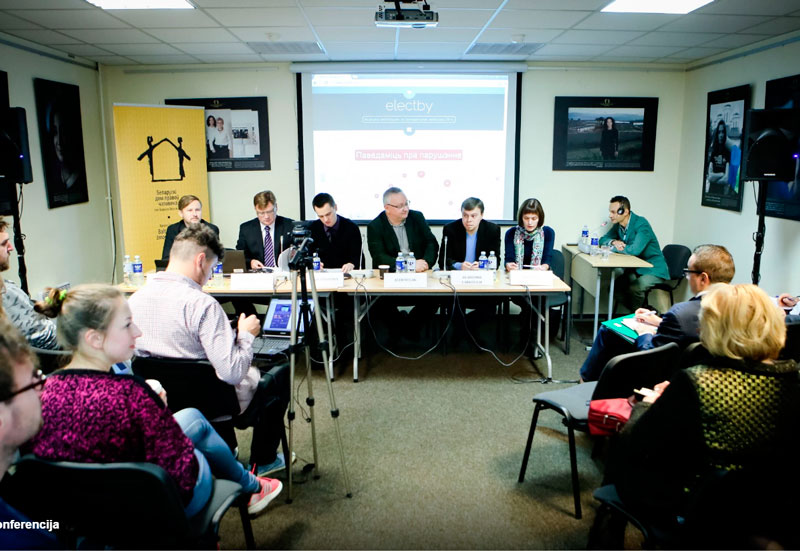Observers criticize presidential elections at press-conference in Vilnius

Press conference in Vilnius on the results of the presidential elections in Belarus. October 13, 2015. Photo: ru.delfi.lt.
Elections in Belarus were undemocratic, non-transparent and non-free, said Belarusian activists who observed the presidential election during a press conference held on October 13 at the Belarusian Human Rights House in Vilnius.
According to a representative of the campaign "Human Rights Defenders for Free Elections" Uladzimir Labkovich, he can only speak about the outcome of the presidential election with “certain sadness”, delfi.lt said.
“The elections started in rather unfavorable conditions, in a situation of ongoing repression, the presence of political prisoners and numerous facts of harassment against journalists,” he said.
It was only in late August that the authorities suspended direct repressions, released political prisoners and ceased the persecution of journalists, civic and political activists. “This is a significant difference in the background of the election campaign as compared to the previous presidential elections of 2010, when it was preceded by a period of so-called liberalization,” said Labkovich.
According to the human rights activist, the release of political prisoners was followed by a few positive trends: greater opportunities for the exercise of civil and political rights, absence of interference in the collection of signatures and carrying out election campaigning.
“We welcome the authorities’ tactics of non-interference in peaceful protests held by opposition leaders, who were not involved in the election campaign. The rallies in Minsk were not accompanied by arrests. However, we deplore the fact that the organizers of these events were later sentenced to heavy fines. The authorities thus failed to completely abandon their repressive practices,” said Labkovich. According to him, the electoral process did not meet a number of key international standards for democratic and free elections. “This was due to the lack of equal access to the media by all the candidates, absence of impartiality of election commissions, use of administrative resources in favor of the incumbent, coercion of voters to participate in early voting and the closed nature of a number of electoral procedures,” said he. “The most important reason for criticism is the lack of transparency of vote count, which does not allow to consider the election results as reflecting the will of the Belarusian people.” Considering all these facts, the observers believe that the elections in Belarus are not free and democratic, and the election of the head of state does not reflect the will of the Belarusian electorate.
The head of the Belarusian Helsinki Committee Aleh Hulak added that the voting result cannot be trusted.
“At all stages of the election campaign all the relevant processes and procedures were not sufficiently transparent, starting from the formation of election commissions. The procedure for the registration of candidates was not clear and transparent; the same applies to such important procedures as voting at home, early voting and voter lists. All of this was not available for the observers. And, of course, the procedure of the counting of votes, just like before, was arranged in such a way that not only observers, but also the majority of commission members could not be sure that the results were consistent with the ballots, i.e. they signed something they did not seen and could not see, so they cannot be responsible for that,” said Hulak.
Observers could not watch the procedure, either. Moreover, Aleh Hulak said that there were many facts of coercion to vote early. More than 36% of early voters (over 41% of all voters), according to Hulak, indicates that early voting in Belarus has become a common form of voting, and this violates the Belarusian Electoral Code. “We have a lot of equivocation going on. People tend to forget that they are forced to participate in the elections, which in fact deprives them of any opportunity to make a free choice,” he said. According to Hulak, there were a lot of anonymous complaints that people were forced to vote early. “Unfortunately, the CEC did not do what it could and should have done. As a result, these approaches have led to a negative assessment by the OSCE observers,” said he.
In addition, he said, there were many promises that everything would be done transparently, but “it turned out to be different”. “Once again, the system demonstrated that it can’t be changed. The system simply does not know how to do differently, and if it did differently, it could not perform its function. Therefore, all the promises remained nothing but promises,” said the Belarusian Helsinki Committee leader.
Dzianis Sadouski, a representative of the campaign Right of Choice, which has monitored the voting process at all of its stages, in turn, stressed that “the presidential election was neither free nor fair, with the counting of votes being nontransparent and the figures announced by the CEC not credible.” The campaign, said Sadouski, could not recognize the results of these elections. Summarizing the statements by the election observers, the moderator of the press Conference, EHU lecturer Tatsiana Chulitskaya said that after the elections journalists tend to ask what support Lukashenka actually had among the population. “Of course, he knows the surveys. But the problem of Belarus is that nobody knows what kind of support he received due to technical violations that we have seen in the course of each campaign,” she said. That is the closed nature of the process does not allow speaking about support of one candidate or another. “These results do not conform to the social structure of the Belarusian society,” said the analyst.

















